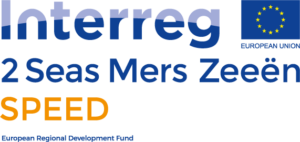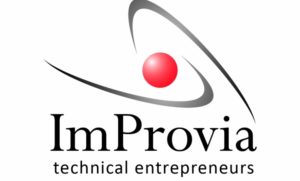Iwan de Waard is co-founder and general manager at ExRobotics, and co-founder of Improvia. ExRobotics is a leading international company specialised in robotic solutions for potentially explosive facilities. By producing robots that are certified for carrying out safety checks in remote locations, they significantly increase safety-measures for employees working at these facilities. Improvia is a service-based firm that provides management and execution of industrial projects concerning complex technologies, while also offering technical consultancy and engineering services. Peter van de Goorberg, CEO and co-founder of Improvia, connected Iwan to us in the context of the SPEED project.
The Interreg SPEED project is aiming at bridging the gap between the Data Science & IoT- market and the Western-European harbor-market. The project research team is currently working on a diagnostic toolkit for supporting high-tech smart port focused entrepreneurs in their professionalization track. Throughout the research phase of the project, we approached experienced and successful high-tech entrepreneurs to learn about their professionalization and growth trajectory. We wanted to find out what information might be useful and relevant to tech-based entrepreneurs in order to professionalize their business.
What is your core output?
As co-founder of ExRobotics (product-based) and Improvia (service-based), Iwan was able to make a very clear distinction between the differences in hurdles accompanying both types of companies at certain points in time. As technologies advance, however, clear distinctions between service and product-based companies become less evident. Nevertheless, understanding the core output of a business can significantly increase effectiveness of strategic planning and execution. The core focus on product or service within the high-tech field may also affect the scalability of the business to some extent.
Co-develop with your customer
Building a specific product that targets a very particular client, encouraged ExRobotics to adopt a co-development approach right from the onset. Involving the customer in the production process has significant benefits for both parties. Co-development not only ensures that the product results in optimally fulfilling the client’s need, but also allows for swift knowledge exchange and feedback loops. This approach enables flexibility and is applicable to both product and service-based businesses.
Understand business management
As a general manager and entrepreneur, Iwan has had to overcome various challenges which provided new perceptions and preparedness concerning future occurrences. This refers to the general knowledge derived only from experience, which is often referred to in the sentence learning by doing. Nevertheless, he agrees that a basic understanding of business management is required in order to be able to professionalize the high-tech business successfully. Throughout the later startup years of the company, Iwan followed a business management program. Due to the combination of immediate practical application that the program facilitated, the experience proved invaluable. The length of the program (5 years in this case) however, could be an impediment to many founders of start-up companies at the earlier stages. They are generally immensely time constrained and have limited knowledge as to the possible benefits of such programs.
Look at the whole picture before taking decisions
This issue brings up the questions of what information is needed, when it is needed, and how to evaluate the possible outcome benefits. Although the last questions are more complex than they initially seem, Iwan provided a first critical step that can immediately be put into practice. Entrepreneurs can very easily become set in the operational day-to-day tasks, which is understandable. Taking the occasional step back and try to form a more holistic view of the company, could enable and support decision-making when it comes to this kind of investment decisions. Consequently, executive management programs, growth-programs or even expert advice can be more carefully selected, budgeted for, and immediately applied, which also increases their attractiveness.
We would like to thank Iwan de Waard at ExRobotics for taking the time to converse with us for the benefit of future tech-based companies and research purposes.
For further information on the Interreg SPEED diagnostic and improvement toolkit, please contact Morane Atzmon (morane.atzmon@uantwerpen.be) or Johanna Vanderstraeten (johanna.vanderstraeten@uantwerpen.be).
To find out more on ExRobotics or Improvia, their product and their team, please visit the websites linked.
This research project was carried out by Johanna Vanderstraeten, Sascha Albers, Rudy Martens and Morane Atzmon.
Johanna Vanderstraeten is assistant professor of (international) entrepreneurship, Sascha Albers is professor of international management, Rudy Martens is full professor of general and strategic management, and Morane Atzmon is Ph.D. candidate at the Faculty of Business and Economics of the University of Antwerp.
This research was supported by Peter van de Goorberg, CEO and co-founder of ImproviaGroup and benefited from the funding of Interreg 2 Seas.






